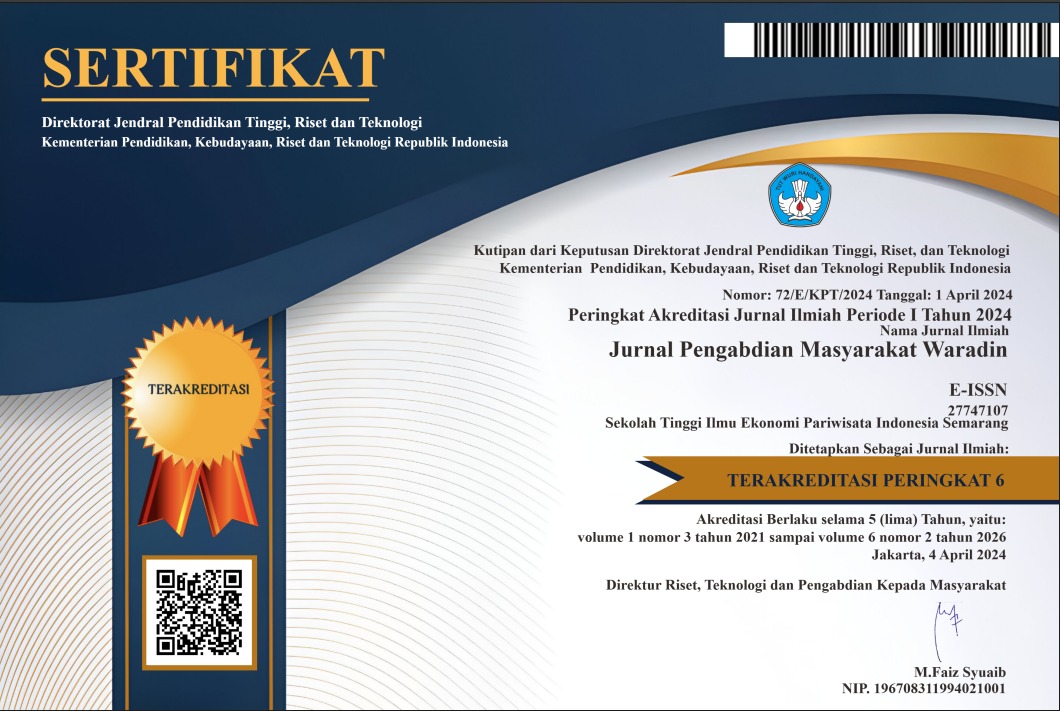Pemberdayaan Digital Perempuan Berkebaya Indonesia
Strategi Peningkatan Kapasitas Organisasi Berbasis Budaya di Era Globalisasi
DOI:
https://doi.org/10.56910/wrd.v5i3.731Keywords:
Digital Empowerment, Digital Transformation, Kebaya Women, Organizational Capacity, Traditional CultureAbstract
This community service program aims to increase the digital capacity and leadership of Indonesian Berkebaya Women (PBI) members through an approach that integrates traditional values with modern technology. The method used is Participatory Action Research (PAR), with the subject of service as many as 13 members of the Banyumas branch of PBI. The activity was carried out in the form of an intensive workshop for three days at the Green Valley Hotel Baturraden, which included three main sessions: Digital Transformation Workshop, Leadership Development, and Content Creation Workshop. The results of the program showed significant achievements, where 80% of participants were able to actively master at least three social media platforms. In addition, 15 quality digital content was created that reflects the organization's cultural identity and values. The digital engagement rate increased from 15% to 50%, demonstrating the effectiveness of training strategies and active participation of participants. As an indicator of the program's sustainability, a Digital Task Force was formed and a Standard Operating Procedure (SOP) was prepared for the management of the organization's digital media. The theoretical findings of this program show that the integration between cultural values and digital capabilities is not contradictory, but rather mutually reinforcing in forming an organizational identity that is adaptive to changing times. This approach has succeeded in creating a culturally based empowerment model that can be replicated in other communities or organizations with similar characteristics. The emphasis on cultural sensitivity in the design of community service programs is the key to success, especially in the context of inclusive and sustainable digital transformation. This program makes a real contribution to strengthening women's capacity based on cultural communities, as well as opening up space for the development of relevant empowerment strategies in the digital era. Thus, this model can be a reference in designing social interventions that respect local wisdom while encouraging digital innovation.
References
Berman, S. J. (2019). Digital transformation: Opportunities to create new business models. Strategy & Leadership, 47(2), 10–17. https://doi.org/10.1108/SL-02-2019-0016
Carayannis, E. G., & Campbell, D. F. J. (2019). Innovation and entrepreneurship in the context of Industry 4.0. Journal of the Knowledge Economy, 10(3), 1234–1250. https://doi.org/10.1007/s13132-019-00585-1
Davenport, T. H., & Ronanki, R. (2018). Artificial intelligence for the real world. Harvard Business Review, 96(1), 108–116.
Filawati, F., Ita Rosvita, & Bungatang, B. (2024). Perempuan dan ekonomi kreatif: Membangun kemandirian peserta didik di era digital Madrasah Aliyah Darul Fallaah Unismuh Kecamatan Bungaya, Kabupaten Gowa. Abdimas Langkanae, 4(2), 65–74. https://doi.org/10.53769/jpm.v4i2.309
Huda, N., & Sari, R. (2021). Pemberdayaan perempuan melalui ekonomi kreatif berbasis digital. Jurnal Pemberdayaan Masyarakat, 2(1), 45–54. https://doi.org/10.30870/jpm.v2i1.1180
Li, L., & Wang, Y. (2020). Digital skills and entrepreneurship in the creative industries. Journal of Business Research, 115, 305–313. https://doi.org/10.1016/j.jbusres.2019.11.015
Muslimah, I. R. (2021). Kepemimpinan perempuan dalam mengembangkan budaya organisasi. Jurnal Kependidikan Islam, 11(2), 198–207. https://doi.org/10.15642/jkpi.2021.11.2.198-207
Prasetyo, H., & Kurniawan, A. (2022). Pengaruh transformasi digital terhadap inovasi bisnis UMKM di Indonesia. Jurnal Ekonomi Digital, 3(2), 77–88. https://doi.org/10.30870/jed.v3i2.1101
Prasetyo, H., & Sutopo, W. (2018). Industri 4.0: Telaah klasifikasi aspek dan arah perkembangan riset. J@ti Undip: Jurnal Teknik Industri, 13(1), 17–26. https://doi.org/10.14710/jati.13.1.17-26
Rahayu, N., & Day, J. (2020). Digital entrepreneurship and innovation in the creative economy. Journal of Small Business and Enterprise Development, 27(7), 1021–1039. https://doi.org/10.1108/JSBED-10-2019-0314
Rahayu, N., Supriyono, I., & Mulyawan, E. (2022). Pembangunan ekonomi Indonesia dengan tantangan transformasi digital. ADI Bisnis Digital Interdisiplin Jurnal, 4(1), 92–95. https://doi.org/10.34306/abdi.v4i1.823
Rinaldi, M., & Putra, A. (2023). Peran teknologi digital dalam meningkatkan keterampilan kreatif siswa. Jurnal Pendidikan Kreatif, 5(1), 23–34. https://doi.org/10.30870/jpk.v5i1.1345
Schwab, K. (2017). The Fourth Industrial Revolution. Crown Publishing Group.
Schwab, K., & Davis, N. (2018). Shaping the Fourth Industrial Revolution. Currency.
Undheim, T. A. (2021). Transforming industries in the age of digitalization. Technological Forecasting & Social Change, 163, 120450. https://doi.org/10.1016/j.techfore.2020.120450







